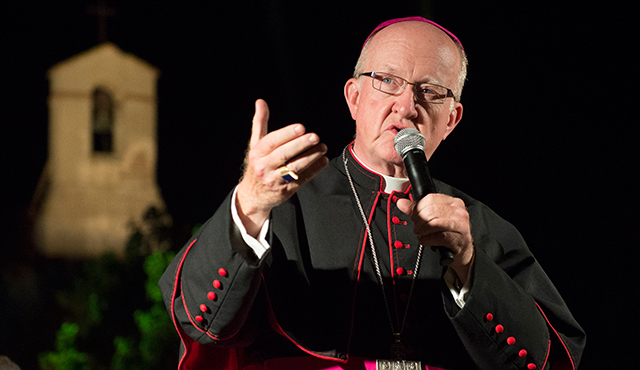Recently, a Superior Court judge in Riverside County issued a ruling overturning California’s assisted-suicide law. As expected, the ruling has been challenged. Still, I am grateful because it offers us an opportunity to revisit important questions about what constitutes healthcare – especially at the end of life – and about good governance. Acknowledging the strong emotions from deeply personal stories that accompany discussions about end of life, we nonetheless have a duty to develop policy based on the integrity of the human person and the common good. We need to discuss facts, rather than determining policy based on emotion and manipulated sentimentalism.
I’d like to focus on two key parts of the ruling. First, it determined “[the] End of Life Act does not fall within the scope of access to healthcare services.” We need to have an open and honest conversation about the definition of healthcare.
When someone commits suicide alone, we rightly call that a tragedy. If the person can be stopped during the attempt, he is given medical assistance to deter him from making the same choice again. However, when a medical professional assists someone to commit suicide, even if he is terminally ill, some would like to call that a form of healthcare. Yet, the acts are the same. Both are intent on taking the life of the individual, regardless of whether he is assisted or unassisted.
At the beginning of this month, my brother bishops and I in California, published “Hope and Healing,” a letter on mental health. Based on our pastoral work, we see an ever-increasing need to provide better resources to those who suffer from mental illnesses and to reduce the stigma surrounding these many difficult conditions, including those who reach a point where it seems that they no longer want to live. We need to ask what we can do to provide better healthcare for those who reach such a desperate state of mind. To walk away from our responsibilities to our brothers and sisters, even if such action is sanitized by legislation, only condemns them to their illness, one which even may be predominantly mental and not physical.
Stephanie Packer, a resident in our diocese, experienced firsthand the fallout of the End of Life Option Act. She suffers from a terminal illness. After the act was passed, she was denied chemotherapy. Instead, her insurance company offered her “aid-in-dying” drugs for $1.20. Stephanie wants to live and she has joined efforts here and in other states to work against assisted suicide. But the legislation enabled her insurance to deny her healthcare, offering a death sentence instead.
The principle “do no harm” has governed healthcare for millennia. With this ruling, we are prompted to take another look at this issue and really focus on the question of healthcare.
This ruling also affords us the opportunity to discuss the way in which the legislation was passed. Because it could not get through a regular session of our state legislature, advocates of assisted suicide pushed it through a special session dedicated to healthcare funding. However, as we have consistently maintained, along with many, many dedicated healthcare professionals, assisted suicide is not healthcare. The court found similarly and, therefore, ruled the law invalid because the legislature is prohibited from enacting bills that are not specific to the subject of the proclamation of an extraordinary legislative session.
We are a nation that has thrived for over 200 years in part because we are governed by the rule of law. But when lawmakers themselves do not use the legislative and legal processes with the transparency and honesty that the rule of law demands, we run the risk of undermining one of the most fundamental aspects of our nation.
Doctors, nurses, seniors and the disabled community, worked with us to witness the integrity of human life which should never be hidden, regardless of the circumstances. Additionally, individuals from various minority groups have voiced to me their concerns that legislation like this uniquely disadvantages them because their communities not infrequently lack resources that the others do not.
I am particularly grateful to the Life Legal Defense Foundation, a group of excellent attorneys who work to defend life at all stages, from conception until natural death. Without their dedication this legal victory would not have been possible. Please support them with your prayers and any other way that you can. Their work is far from over.
Meanwhile, in Orange County, we join with the statewide Whole Person Care Initiative between Catholic health care ministries, dioceses, and parishes in moving forward the conversations and actions to help our loved ones know that they are loved, wanted, and worthy as they contemplate the end of their lives.
We are hosting “Care, Prepare, and Connect” trainings at parishes to help parish leaders and communities continue to improve our accompaniment of families and individuals in need, address access across the continuum of care, Advance Care Planning, and how to start the conversations.
As you all know, building a culture of life requires many components – legal and legislative to name a few. But it also means changing hearts and minds. That starts with our own personal prayer and conversion which should manifest itself in the way that we treat others, particularly those who are suffering the most. I am grateful for your continued support and efforts in these many facets required to build a culture of life.

